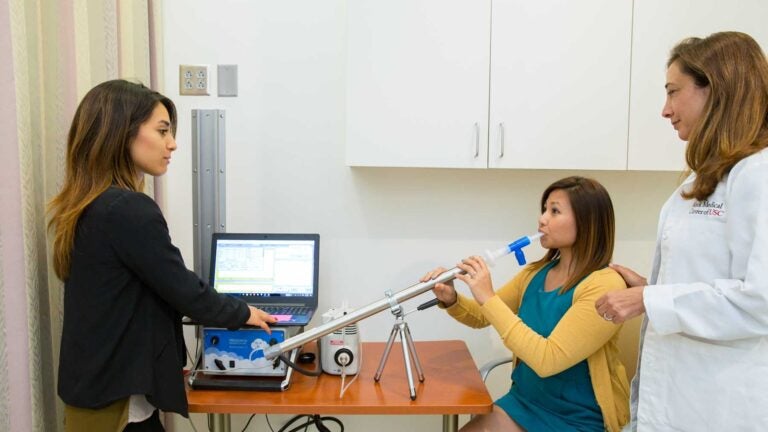
Ruth Vergara, left, and Linda J. Hovanessian-Larsen watch as Mary Dacuma demonstrates the BreathLink device. (Photo/Ricardo Carrasco III)
A simple breath test could be the next step in diagnosing breast cancer
Clinical trial at USC and other cancer centers looks at effectiveness of a new device that could prevent unnecessary testing
The USC Norris Comprehensive Cancer Center is recruiting people for a clinical trial that will research the effectiveness of a breath test for breast cancer diagnostics. The BreathLink device captures a two-minute sample of a patient’s breath and provides prompt results on whether there are indications of breast cancer. If proven effective, the test would be used with mammograms to rule out false-positive tests, sparing patients the pain, cost and anxiety of unnecessary biopsies.
This kind of technology would be a welcome asset to our field.
Linda Hovanessian-Larsen
“Diagnosing breast cancer requires the utmost vigilance, but we need to temper this vigilance with accuracy to prevent unnecessary testing,” said Linda Hovanessian-Larsen, associate professor of clinical radiology, director of the division of women’s imaging and director of radiology research in women’s health at the Keck School of Medicine of USC. Larsen is leading the trial at USC Norris and much of her research focuses on improving the accuracy and efficiency of breast cancer diagnostic techniques. “This kind of technology would be a welcome asset to our field, and we are eager to assess the safety and efficacy of this test.”
BreathLink is a non-invasive testing device, manufactured by Menssana Research Inc., that collects, concentrates and analyzes the organic compounds in a patient’s breath sample within minutes. Test results then are uploaded to Menssana’s laboratory in New Jersey.
While the test cannot diagnose disease, it can indicate if the patient should undergo further testing, which can save time and money while preventing additional emotional distress.
Current research is evaluating the device’s effectiveness in detecting lung cancer, breast cancer, heart transplant rejection, radiation exposure and pulmonary tuberculosis. The device is not yet approved by the Food and Drug Administration.
USC Norris is the first of five cancer centers in the United States participating in the trial and the only center in California. The trial is partially funded by the National Institutes of Health and currently open to women who have a breast-related concern that requires mammography. This includes patients who require short term follow-up or additional workup from screenings, as well as women who exhibit clinical symptoms such as a breast lump. Women interested in enrolling in the trial can call (323) 369-7775.
Research was supported by the National Cancer Institute of the National Institutes of Health (award number R44CA203019).
